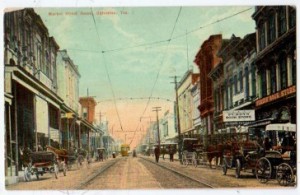Samuel Maas
Values Codes I – E – L
Samuel Maas was born in 1810 to a wealthy family in Meinbeim, Baden, Germany.
His privileged upbringing provided him a thorough education in English and French, which served him well during his career.
As Samuel grew to maturity, he was expected to remain in the family gold and silver business, but his sense of adventure brought him to the United States in the 1830’s.
Along the Way . . .
After a brief stay in Pittsburg, Pennsylvania, during which he made several English and French-speaking business contacts, Samuel Maas moved to South Carolina where he had relatives, the Hart family.
He again established business relationships and was engaged to marry Caroline Hart.
But he was drawn to opportunities blooming in the Republic of Texas.
Texas
Samuel Mass’ first attempt to reach Texas was a failure.
He loaded a schooner with lumber for building a house, but a storm wrecked the ship off the Florida Keys, forcing him to swim ashore.
In 1836, he arrived in Nacogdoches County, where he took up Spanish and found work translating Spanish land titles into English.
Three years later he moved to the fledgling port city of Galveston. He set up mercantile establishments there and in Houston.
Samuel Maas sailed to Europe many times to conduct trade for Texas.
During an 1844 visit to Germany, he attended a performance featuring Isabella Offenbach, an opera singer and sister of composer Jacques Offenbach.
Isabella had royal suitors, but she took Samuel’s hand in marriage.
Shortly after arriving in Galveston, Isabella was stricken with yellow fever.
She survived and dedicated her life to bringing European high culture to saloon-sprinkled Texas.
Samuel Maas also helped in that effort, writing musical reviews for local papers.
Samuel Maas strove to remain cultured in the midst of business pursuits, and kept a strong interest in linguistics, reading, writing, and the performing arts.
Family
Samuel Maas had difficulty maintaining a healthy relationship with Isabella.
Business dealings and other ventures called for extended travels, and Isabella was often left alone with their four children.
During the Mexican-American War, Samuel spent an entire year in Vera Cruz reporting for The Civilian Galveston News (1846-47).
Isabella grew increasingly unhappy and eventually separated from Samuel.
She moved in with her daughter and son-in-law, who had a house across the street from Samuel’s.
Isabella Offenbach Maas passed away in 1891.
Samuel Maas died in Galveston in 1897.
They left behind four children and sixteen grandchildren.
Jonathan Friedmann is the curator for this Samuel Maas exhibit.
For the Isabella Offenbach Maas exhibit, click here.
Visit Cantor Friedmann’s Music Blog: Thinking On Music
==========================================
Jews in the News
Around this Time
The First Jewish Organization in Texas, Houston — 1855
Hebrew Benevolent Association — For the first time we are enabled to record the organization of a regular Jewish society in the State of Texas, which will no doubt count its tens if not hundreds of our congregations before many years. At present we are only enabled to give the subjoined brief statement, which is extracted from the Houston Telegraph of March 7th, which has been sent us by the parties interested, though we should be pleased to obtain a more complete manuscript account of their proceedings. Will the president oblige us?
A large number of the citizens of our town, professing the faith of Abraham, Isaac and Jacob, have formed themselves into a body under the name of the Hebrew Benevolent Association of the City of Houston, for the purpose of mutual assistance and relief, as well as to render aid to all poor of their church, whether in pecuniary or physical distress.
Their first business was to subscribe as a voluntary contribution a sufficient amount of money to build a fence around their graveyard. The second was to organize themselves into an association, by electing the following named gentlemen as the first officers of the fraternity, viz.: Lewis A. Levy, president; G. A. Simon, vice president; Abraham G. Levy, M.D., secretary; Isaac Coleman, treasurer; Joseph Rosenfield, G. Gerson, Henry Wiener, trustees; and T. Veltman, marshal. They have also adopted a set of rules and regulations, which were ordered to be printed.
We have the pleasure to be personally acquainted with several of ‘the above-named gentlemen, and know them to be among the most kind-hearted, humane, and high-minded businessmen of our city; and we hail with pleasure the organizing of such societies before the sickly season commences, and bid them God speed.”
— The Occident, Philadelphia, July 1855 [reprinted in WSJHQ 11/1]
